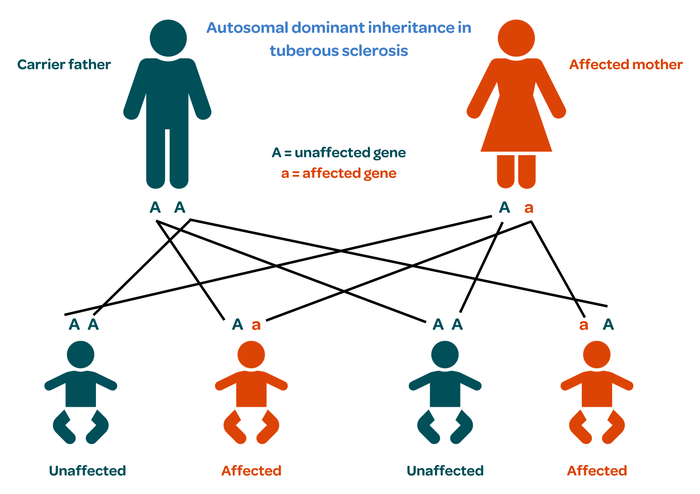What is tuberous sclerosis?
Tuberous sclerosis (also known as tuberous sclerosis complex or TSC) is a rare genetic condition that causes non-cancerous (benign) growths in various parts of the body, including the kidneys, brain and heart.
Tuberous sclerosis can affect people in different ways, so it is hard to give exact figures on how many people have the condition.
It is thought that there are between 4,000 and 11,000 people with tuberous sclerosis in the UK. It is present from birth, although symptoms may not develop until early adulthood. Males and females are affected equally.
What are the signs and symptoms of tuberous sclerosis?
Some people with tuberous sclerosis have very mild symptoms whereas others are severely affected. Common symptoms include:
- epilepsy – this usually starts in childhood. The seizures may disappear or become less frequent with age, but they may have already caused long-term brain damage.
- learning difficulties – this can include poor memory and attention span, and difficulty making plans or organising actions.
- behaviour difficulties – this can include impulsive behaviour, aggression, and self-harm.
- breathing difficulties
- high blood pressure
- sudden severe stomach pain
- blood in the urine (haematuria) – caused by internal bleeding.
Half of all children with tuberous sclerosis are also diagnosed with autism. However, it is not clear if this is a symptom of the condition itself or a result of the epilepsy seizures.
What causes tuberous sclerosis?
Tuberous sclerosis is a genetic condition caused by mutations or abnormalities in one of two genes – TSC1 or TSC2. These genes control cell growth. Mutations in these genes cause excessive growth and tumours in different parts of the body. The growths affect how well the organs work and may eventually lead to long-term damage.
How is tuberous sclerosis diagnosed?
Tuberous sclerosis is diagnosed by a physical examination and imaging scans. These may include ultrasounds of the kidneys and magnetic resonance imaging (MRI) or computed tomography (CT) scans of the brain.
An echocardiogram (ECG) may be used to check for any issues with the heart.
Genetic testing may also be available.
Does tuberous sclerosis affect other parts of the body?
Tuberous sclerosis can cause non-cancerous tumours to develop throughout the body. As well as the kidneys, the most common parts of the body to be affected are the:
- eyes
- skin
- lungs
- heart
- brain.
People with tuberous sclerosis may also have skin abnormalities, including patches of different coloured or thick skin, or red spots on the face that look like acne.
Does tuberous sclerosis run in families?
Around three out of four cases of tuberous sclerosis occur without any previous family history, although it can still be passed on to the next generation.
In one out of four cases, the condition has been inherited from a parent. This occurs in a pattern known as autosomal dominant inheritance.
Everybody has two copies of the TSC genes, one from each parent.
One copy of the faulty gene is enough to cause the condition.
There is therefore a one in two chance that a child born to an affected person will receive the abnormal gene and eventually develop tuberous sclerosis themselves, although this could be very mild.

How is tuberous sclerosis treated?
There is currently no direct cure for tuberous sclerosis, so treatment focuses on managing the symptoms.
The growths caused by tuberous sclerosis are not cancer and are not infectious. Some growths shrink and disappear by themselves. Others may need medication such as mTOR inhibitors to shrink them. In rare cases, the growths may need to be surgically removed if they are affecting how well the organ works.
Epilepsy can usually be treated with medication. If this is not effective, surgery may be needed to remove any tumours in the brain that are causing the seizures.
Blood pressure medication can help to protect kidney function.
Children with tuberous sclerosis may need additional support at school.
Laser therapy or medication may be prescribed to treat skin abnormalities. High SPF (sun protection factor) sunscreen should also be worn, even in dull weather.
Some people with tuberous sclerosis have very few symptoms and can live normal, healthy lives. However, others will need long-term care and support.
Where can I get more information or support about tuberous sclerosis?
For more information on tuberous sclerosis including its diagnosis, symptoms and treatment, visit The Tuberous Sclerosis Association.

Publication date: 11/2023
Review date: 11/2026
This resource was produced according to PIF TICK standards. PIF TICK is the UK’s only assessed quality mark for print and online health and care information. Kidney Care UK is PIF TICK accredited.